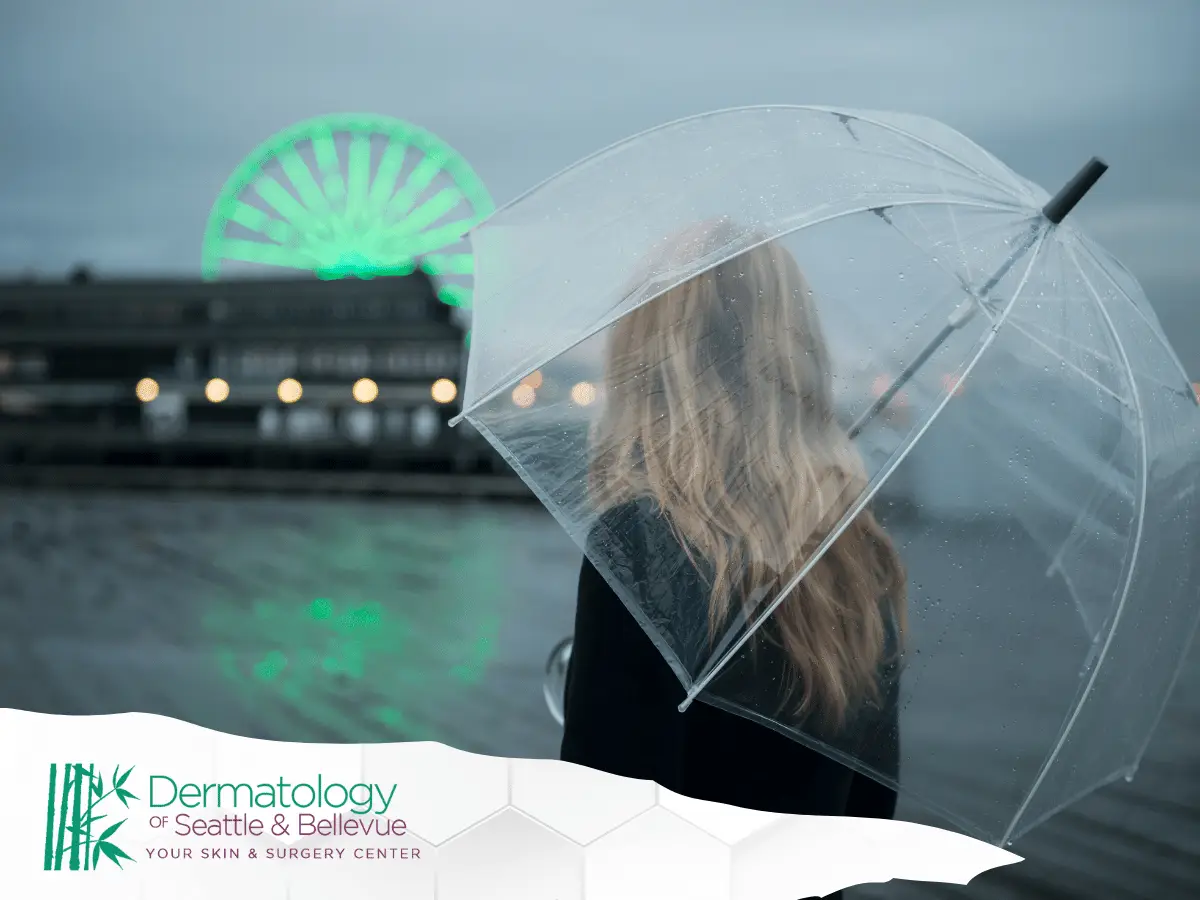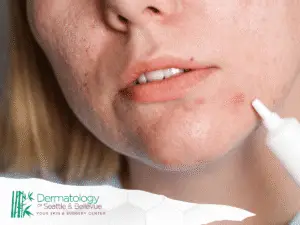Psoriasis is a chronic skin condition that affects millions worldwide, yet its triggers and relief strategies often shift depending on the environment. For patients living in marine climates—where moisture, salt air, and fluctuating weather are part of daily life—understanding how these factors impact psoriasis is key. Psoriasis management in moist, marine climates requires balancing the benefits of humidity and salt water with the risks of flare-ups caused by seasonal variation, sunburn, or exposure to chlorine.
Quick Summary
- Marine humidity may reduce dryness, but damp clothing, sweat, and prolonged moisture can trigger irritation and flares.
- Seasonal shifts matter: winter heating and low sun worsen plaques; summer sun/saltwater may help but raises sunburn risk.
- Sea water minerals can soothe plaques and exfoliate; moisturize after swims and avoid staying in wet suits too long.
- Chlorinated pools can dry and irritate skin; rinse immediately, moisturize while damp, and limit exposure if symptoms worsen.
- Dead Sea climatotherapy combines mineral baths and controlled sun for longer remission, but it’s not a cure and needs medical guidance.
Understanding Psoriasis in Marine Weather Conditions
Marine environments can provide both relief and irritation for people with psoriasis. High humidity often helps prevent skin from drying out, reducing irritation and improving comfort for many patients. At the same time, damp weather and prolonged moisture exposure may worsen psoriasis symptoms in some, especially if the skin barrier is already compromised. For psoriasis patients in regions like Seattle or coastal areas, careful observation of how their skin reacts to marine conditions is an essential step in developing an effective management plan.
Seasonal Variation: Winter, Spring, and Summer Impacts on Skin
Seasonal variation strongly influences the appearance of psoriasis. In cooler months, cold winds and reduced sunlight exposure can cause flare-ups, while spring and summer often provide more natural sunlight and opportunities for swimming, which may soothe psoriasis. Still, each season has its challenges:
- Winter: Dry indoor air from heating and less sun exposure often worsen plaque psoriasis.
- Spring: Fluctuating temperatures and pollen can trigger irritation or flares.
- Summer: Salt water and sunlight can improve symptoms, but overexposure to UV radiation may increase the risk of sunburn.
Recognizing these seasonal changes helps patients with psoriasis adjust their skincare and treatment routines throughout the year.
Psoriasis Symptoms and Triggers in Humid Environments
Moist climates often bring some relief from dryness, yet they can also create new challenges for psoriatic patients. High humidity may prevent flaky skin from worsening, but sweat and damp clothing can irritate sensitive areas of skin, leading to flare-ups. Common psoriasis symptoms in these environments include itching, redness, thickened patches, and occasional scaling. Patients with psoriasis often notice that stress, infections, and abrupt changes in weather patterns remain consistent triggers regardless of climate, but prolonged dampness can intensify irritation.
Salt Water and Its Role in Soothing Psoriasis
For centuries, salt water has been praised for its therapeutic effects on the skin. In psoriasis management, both sea water and Dead Sea water play an important role:
- Mineral-rich composition: Salt water naturally contains magnesium, calcium, and potassium, which can help soothe psoriasis plaques.
- Gentle exfoliation: Salt helps remove dead skin cells, softening thickened patches.
- Improved hydration: Minerals in salt water may assist with moisture retention, preventing excessive dryness.
- Reduced inflammation: Some patients report less irritation and itch after regular swimming in sea water.
Still, not all salt exposures are beneficial—too much salt or prolonged soaking can lead to irritated skin.
Swimming Outdoors: Benefits and Risks for Psoriatic Patients
Swimming in oceans or natural salt water sources can soothe psoriasis, but it’s important to balance benefits with potential risks:
- Benefits: Salt water exfoliates, natural sunlight exposure may improve symptoms, and cooler water reduces itching.
- Risks: Risk of sunburn increases in summer months, especially for patients with psoriasis whose skin is already sensitive. Prolonged exposure to ocean water can sometimes leave skin feeling dry or irritated.
Patients should always moisturize after swimming, avoid staying in wet bathing suits for too long, and use sunscreen to protect against damaging rays.
Exposure to Chlorinated Water in Pools
Chlorinated water is a double-edged sword for patients with psoriasis. While swimming provides exercise and stress relief—both important for overall health—exposure to chlorine can dry out skin and trigger irritation. Psoriatic patients often report increased itching or redness after frequent pool use. To minimize these effects:
- Rinse thoroughly with fresh water immediately after swimming.
- Apply a fragrance-free moisturizer or ointment while skin is still damp.
- Limit time in heavily chlorinated pools if flare symptoms worsen.
Ocean Swimming vs. Pool Swimming: Key Differences for Skin
The therapeutic effects of ocean water often outweigh the drawbacks of pool swimming. Compared to chlorinated pools, ocean swimming offers:
- Natural minerals and salts that gently exfoliate and soothe psoriasis.
- Fewer chemical irritants that can trigger flare-ups.
- Exposure to natural sunlight, which may help regulate immune responses in the skin.
However, the ocean isn’t risk-free—salt water may cause dryness if patients stay in too long, and sunburn risk rises without proper protection. Pool swimming, though less soothing, may still be manageable with good skincare routines.
The Science Behind Climatotherapy of Psoriasis
Climatotherapy refers to using specific climates and natural resources to treat chronic skin conditions. For psoriasis, moist, marine environments—and particularly Dead Sea climatotherapy—have shown remarkable therapeutic effects. Scientific studies highlight:
- Reduced scaling and inflammation after regular exposure to sea water and controlled sun exposure.
- Improvement in psoriasis symptoms due to minerals found in salt water, including magnesium and potassium.
- Positive results in psoriatic patients who undergo structured climatotherapy programs, supported by systematic review and clinical research.
Climatotherapy does not cure psoriasis, but it can significantly extend remission periods and improve quality of life for patients seeking non-invasive treatment options.
Dead Sea Climatotherapy: Why It’s Considered Unique
Among all forms of climatotherapy, Dead Sea climatotherapy stands out as one of the most researched and effective approaches for psoriasis. The Dead Sea, located at the lowest point on Earth, combines several therapeutic factors:
- High salt concentration: Roughly 10 times saltier than ocean water, making it rich in minerals that soothe psoriasis.
- Filtered UV radiation: The region’s extra-thick atmosphere filters out more damaging UVB rays, lowering the risk of sunburn while allowing therapeutic sun exposure.
- Stable climate: Consistent weather with low rainfall and long sunny days provides an ideal environment for controlled therapy.
This unique combination makes Dead Sea dermatology clinic programs especially effective in managing psoriasis symptoms and extending remission.
Main Salts and Mineral Water Effects on Skin Health
The Dead Sea’s main salts—magnesium, bromide, calcium, and potassium—play an important role in supporting skin health for patients with psoriasis. These minerals:
- Strengthen the skin barrier and improve hydration.
- Help exfoliate and remove dead skin cells.
- Reduce irritation and soothe inflamed areas of skin.
- Provide therapeutic effects when used in baths, wraps, or mineral water treatments.
Similar benefits are observed in other forms of mineral water therapy and balneotherapy, though the Dead Sea remains the gold standard for psoriasis patients.
Dead Sea Treatments and Spa Therapy Approaches
Dead Sea treatments often combine mineral-rich bathing with structured sun exposure, creating a therapeutic cycle proven to reduce psoriasis flare frequency. Spa therapy in this setting may include:
- Dead Sea water baths: Daily immersion sessions that soften plaques and soothe psoriasis symptoms.
- Mineral mud therapy: Application of Dead Sea mud to reduce scaling and irritation.
- Controlled sun exposure: Scheduled time outdoors under medical supervision to maximize therapeutic UV benefits without risk of sunburn.
These Dead Sea treatments often form part of a holistic program that blends climatotherapy with modern dermatology for long-lasting results.
Retrospective Study and Prospective Cohort Study Findings
Scientific evidence supports climatotherapy as a valuable approach in the management of psoriasis. A retrospective study of psoriatic patients who underwent Dead Sea climatotherapy showed significant improvement in psoriasis symptoms, with many reporting extended remission periods lasting several months. Similarly, a prospective cohort study confirmed reductions in scaling, itching, and overall severity scores. These studies highlight how structured exposure to mineral-rich water and natural sunlight can complement traditional psoriasis treatment options.
Results From Systematic Review and Clinical Evidence
A systematic review of Dead Sea climatotherapy and related balneotherapy programs found consistent improvements across patient groups. Results often included:
- Decreased plaque thickness and redness.
- Reduced scaling and improved skin hydration.
- Lower frequency of psoriasis flare in the months following therapy.
- Enhanced quality of life for patients due to reduced visible symptoms.
Though not a permanent cure, clinical evidence shows that climatotherapy provides meaningful therapeutic effects for many patients with psoriasis, particularly when combined with dermatology care back home.
Ultraviolet Radiation, Sunlight Exposure, and Risk of Sunburn
Natural sunlight exposure is one of the most important therapeutic elements in climatotherapy, but it carries risks. While ultraviolet radiation helps regulate immune overactivity in the skin, overexposure increases the risk of sunburn. Patients with psoriasis should:
- Follow controlled sun exposure schedules, especially during summer months.
- Use sunscreen on unaffected areas of skin to prevent damage.
- Wear protective clothing after treatment sessions to avoid overexposure.
- Understand that even in the Dead Sea region, risk factors include dehydration, heat stress, and sunburn if guidance is ignored.
Balanced sun exposure remains a cornerstone of psoriasis management in marine and therapeutic climates.
Balancing Natural Sunlight and Phototherapy Treatments
For patients with psoriasis, sunlight can be both therapeutic and risky. Controlled natural sunlight exposure helps reduce inflammation and supports skin healing, but excessive exposure increases the risk of sunburn. In dermatology, ultraviolet phototherapy offers a medical alternative—providing precise doses of UV light under clinical supervision. This balance allows patients to benefit from light therapy without the unpredictability of weather or the dangers of overexposure. Many psoriasis patients benefit most from a combination of natural sunlight during spring or summer and clinical phototherapy in cooler months.
Balneotherapy, Thermal Water, and Other Therapies
Balneotherapy—using mineral-rich water for therapeutic purposes—has long been used to manage chronic skin conditions. For psoriasis patients, thermal water baths and spa therapy can:
- Relieve itching and soothe irritated skin.
- Promote removal of scales through natural exfoliation.
- Support hydration and reduce dryness.
- Provide relaxation, lowering stress (a known trigger for psoriasis flare).
Other therapies, such as combining balneotherapy with light therapy, can enhance results, though responses vary among patients.
Managing Plaque Psoriasis and Pustular Psoriasis in Moist Climates
Different forms of psoriasis respond differently to climatotherapy and water-based treatments.
- Plaque psoriasis: The most common type, often improves with salt water swimming, Dead Sea climatotherapy, and controlled sun exposure.
- Pustular psoriasis: More severe and sensitive; requires careful dermatologist supervision before trying salt or spa therapies.
- Psoriasis flare management: Moist marine climates may reduce scaling for some, but damp clothing and humidity can also trigger flares in others.
Recognizing which type of psoriasis you have is critical for safe management, as therapies effective for plaque psoriasis may worsen symptoms in pustular psoriasis.
Moisturize and Protect: Daily Tips for Skin Care
For patients with psoriasis in marine climates, daily skincare plays an essential role in minimizing irritation and flare frequency. Key tips include:
- Moisturize often: Apply ointments or creams immediately after bathing or swimming to lock in hydration.
- Choose fragrance-free products: Perfumed lotions may worsen irritated skin.
- Use sunscreen carefully: Apply broad-spectrum sunscreen to prevent sunburn while still allowing therapeutic sun exposure under guidance.
- Wear breathable fabrics: Cotton and other light materials reduce friction and prevent overheating of prone skin areas.
Even with climatotherapy or spa therapy, consistent skincare routines remain the foundation of psoriasis management.
Risk Factors for Psoriasis Flare in Marine Climates
Moist environments can help soothe psoriasis, but certain risk factors may still cause flare-ups. These include:
- Staying in wet bathing suits too long after swimming.
- Exposure to chlorinated water without rinsing.
- Sudden changes in weather that stress the skin barrier.
- Stress and poor sleep, which remain internal triggers regardless of climate.
Patients should remain mindful of how their skin reacts to marine conditions, since what soothes psoriasis for one person may worsen symptoms for another.
Statistical Analysis and What It Means for Patients
Statistical analysis from multiple climatotherapy studies provides promising results for patients with psoriasis. Data consistently shows:
- Improved remission rates following Dead Sea climatotherapy compared to conventional therapy alone.
- Significant reductions in scaling, redness, and itching symptoms.
- Sustained improvements lasting from weeks to months in many patients.
For psoriatic patients, these results underline the value of climatotherapy as a supplemental treatment approach, especially when combined with dermatology care, ongoing therapy, and lifestyle changes.
Therapeutic Effects of Sea Climatotherapy and Balneotherapy
Sea climatotherapy and balneotherapy work by combining natural elements—sunlight, mineral water, and salt—to soothe psoriasis symptoms. Patients often experience:
- Softer plaques due to the exfoliating effect of salt.
- Reduced scaling and itching from mineral-rich water.
- Longer remission periods when therapies are completed consistently.
- Lower stress levels, which directly benefit psoriasis management.
While these therapeutic effects are not a cure, they provide an important way of improving quality of life and controlling disease activity in psoriatic patients.
Practical Guide for Patients With Psoriasis in Coastal Regions
Living near the ocean offers unique opportunities for people with psoriasis. Practical tips include:
- Swim in natural sea water when possible, then moisturize immediately after.
- Limit exposure to chlorinated pools if skin irritation increases.
- Use protective clothing and sunscreen to balance sun exposure with skin safety.
- Monitor how seasonal variation affects your psoriasis symptoms and adjust treatment routines accordingly.
- Discuss options like spa therapy or balneotherapy with a dermatologist before beginning.
Dermatology Resources: National Psoriasis Foundation and Local Clinics
Reliable resources are critical for patients seeking accurate information. The National Psoriasis Foundation offers guides, treatment updates, and patient support groups. Coastal dermatology practices, and specialized programs such as those at Dead Sea dermatology clinics, also provide individualized treatment plans. Patients considering climatotherapy abroad should ask about prospective cohort study findings, clinical oversight, and integration with existing treatment plans before committing.
Conclusion: Integrating Climate, Therapy, and Lifestyle in Psoriasis Management
Psoriasis management in moist, marine climates blends the benefits of salt water, controlled sun exposure, and therapeutic spa practices with daily skincare and medical guidance. From swimming outdoors to Dead Sea climatotherapy, patients with psoriasis have multiple options to soothe psoriasis symptoms and extend remission. While climatotherapy and balneotherapy provide valuable therapeutic effects, consistency in moisturization, protective clothing, and dermatologist-guided care ensures the best results. By understanding seasonal variation, managing risk factors, and using trusted resources, patients can find a balanced, sustainable way to manage psoriasis in marine environments.
Disclaimer: Educational Purposes Only
This article is intended for educational purposes only and does not replace professional medical advice. Patients with psoriasis should consult a licensed dermatologist or health care provider before beginning any new therapy, spa program, or skincare routine to ensure safety and effectiveness.





